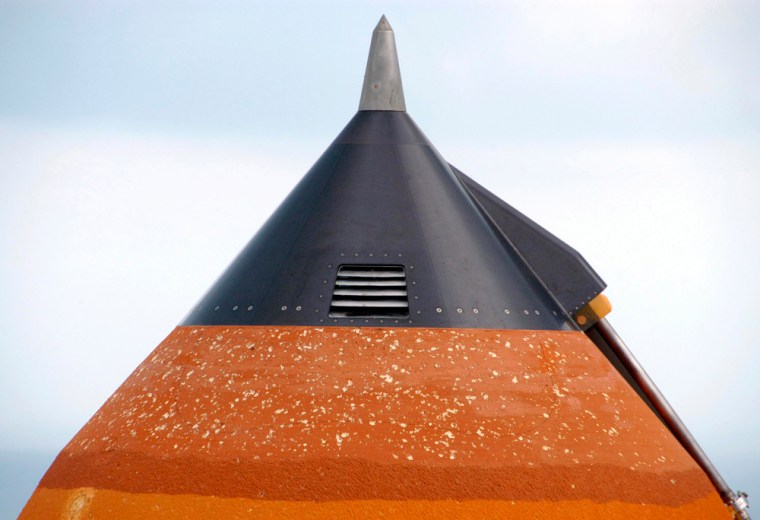NASA on Tuesday postponed next month’s launch of the space shuttle Atlantis after a hailstorm left hundreds of small dings on the spacecraft’s external fuel tank.
The launch, which had been set for March 15, was pushed back to at least late April to give NASA time to make repairs.
NASA technicians planned to move the shuttle back to a giant hangar as early as this weekend to examine the damage and decide whether repairs can be made at the Kennedy Space Center or whether the tank needs to be returned to its manufacturer in New Orleans.
“At this point, we don’t see anything that looks irreparable, but we really want to get it back to where we can look at it up close,” said John Chapman, external tank manager.
The storm Monday lobbed hailstones the size of golf balls at the launch pad, making a ring of hundreds, if not thousands, of dings on the upper reaches of the 153-foot-tall (47-meter-tall)external tank. It crushed some foam along wedge-shaped brackets, an area where foam has been known to shed in the past.
The hail also caused cosmetic damage to more than two dozen tiles along the shuttle’s left wing.
“This constitutes, in our evaluation, the worst damage we have ever seen from hail on the external tank foam,” said Wayne Hale, manager of the space shuttle program. “We have had hail a number of times in the past. Hail is not unusual in Florida.”
Russians go first
The launch of Atlantis would have to be after a Russian Soyuz vehicle completes a mission to the international space station in the first part of April, putting the next opportunity likely between late April and late May, officials said.
NASA managers had hoped to fly five shuttle missions in 2007, the most ambitious schedule in five years, and Atlantis’ flight was set to be the first of the year. The next shuttle flight after that was set for June.
Hale said he was confident the goal of five flights could still be met. He said, “There might be some small effect on a couple of later flights, but by the time we roll around to the end of the year, I expect we would be fully able to catch back up.”
During their 11 days in space, Atlantis’ astronauts are scheduled to deliver a 35,000-pound (16,000-kilogram) addition to the international space station, the heaviest ever, along with a new pair of solar arrays. Crew members will be tasked with unfurling the solar arrays, folding up an old pair and conducting at least three spacewalks.
Localized weather
The thunderstorms moved quickly and had winds of more than 60 mph (100 kilometers per hour). The hail was between a half-inch and 2 inches (1 to 5 centimeters) in diameter and hit only at the NASA space center. The National Weather Service considers three-quarters-inch (2-centimeter-wide) hail to be severe, said David Sharp, a meteorologist with the weather service.
Slideshow 12 photos
Month in Space: January 2014
“Most people didn’t see thunderstorms, let alone severe thunderstorms,” Sharp said. “It only occurred in one location, and that was NASA’s Kennedy Space Center complex.”
In 1999, hail from a storm made 650 dings in the space shuttle Discovery’s external tank, forcing NASA to delay a launch and return the spacecraft to the Vehicle Assembly Building. In 1995, Discovery was sent back to the Vehicle Assembly Building because of fuel-tank damage caused by a pair of woodpeckers that drilled about 200 holes in the rust-colored foam insulation, apparently in an attempt to roost and build nests.
Hail also hit Atlantis during prelaunch processing in 1990, causing minor damage.
The insulating foam on the external tank is of special concern to NASA since foam flew off space shuttle Columbia during liftoff in 2003 and struck the orbiter. The damage allowed fiery gases to penetrate Columbia during re-entry, breaking up the craft and killing its seven astronauts.
NASA redesigned the external tank, removing large amounts of foam, before last year’s three successful shuttle missions. The space agency plans another design change to the tank before the shuttle program ends in 2010.

